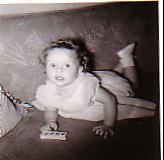 They took her baby, a beautiful, blue-eyed baby girl I’m told, to the infirmary for medical care. It appeared to be nothing serious at all though in the end, so she told them she thought her little girl was well enough to be with her, rather than in their care.
They took her baby, a beautiful, blue-eyed baby girl I’m told, to the infirmary for medical care. It appeared to be nothing serious at all though in the end, so she told them she thought her little girl was well enough to be with her, rather than in their care.
They told her to come back in the morning; they would discharge her then. She went back in the morning, and they told her that her infant had died in the night. They never did produce a body though. I can’t imagine the horror.
Many decades later, a Family Constellations therapist tells me my grandmother suffered the loss of a baby, possibly two, one of them definitely a girl. I resist the statement, argue a little with him, tell him he could have no way of knowing this. But afterwards, I call my cousin to find out.
He was right, and suddenly my grandmother’s life—the magnitude of her losses and their impact on her family, on all of us in her tribe—came into focus. She’d lost her firstborn too, to SIDS or childhood illness of some sort, and then years later, was taken into a prisoner of war camp and separated from more of her children, not knowing whether they were dead or alive, utterly helpless to protect them or feed them or reassure them in the ways mothers are desperate to do for their children.
The story explains the tidal wave of pain that landed in our home when my grandmother moved in to live with us for a number of years. It explains what split her in two, what kept much of her soul hidden beneath a brittle, impervious, irritable outer layer. Why she saw not so much the unique beauty of her grandchildren when she looked at us, but rather only loss.
The story explains why she wandered the hallway outside my bedroom in the night when I was a child, why she’d stand in the shadows to watch us sleep, and why she turned gruffly away when aware she’d been noticed. It explains why she accused me of stealing things from her bedroom, even though I was too afraid to go into it, and why she disliked me utterly, for nothing more than having a runny nose. It explains, at least in part, why I wanted so desperately, even back then, to protect my mother. Why I loved her fried potatoes, but disliked my grandmother’s.
It explains why my grandmother and I never bonded even though she lived with us, and why I never thought to go to her funeral at her passing when I was seventeen years old. It explains why it took almost four decades for me to experience her as a human being, to weep for her losses, and for the way they have continued to ripple out into the lives of those who have come after her.
My grandmother was one of thousands who suffered this, I’ve learned—12,000 perfect babies were taken from their mothers during this time, to further the supposedly superior Aryan race. Many thousands of families on all sides were torn apart in a million ways during that horrible war. The aftershocks that have continued to impact so many are difficult for me to wrap my mind around.
But somehow the psychological legacy left by these experiences now makes perfect sense to me. It explains my inordinately powerful desire to protect children, parents, anyone that seems vulnerable. It explains invisible loyalties to vague but powerful feelings of guilt and failure. It explains my terror of being charged with negligence somehow, and potentially having to live with an unbearable sense of shame and self-recrimination. It explains the ever-ready flight-or-fight response so common in the family, the energy that goes into avoiding pain and conflict, my resistance to systems that claim authority and demand allegiance.
They say, in the simplest of epigenetic explanations, that our genes literally show the famines our grandmothers suffered. Do these tendencies then, present in so many variations in so many of us in the extended family, not make perfect sense in light of the fact that my grandmother was utterly impotent in the face of the thieves that tore apart her family and life?
In the weeks since my family’s story has come to my awareness, I’ve felt sorrow, but I’ve ironically also been basking in a warm glow of something I can’t quite find words for. It involves, of course, admiration and gratitude and love for my parents, for the courage, determination and resilience they have so tenaciously clung to.
But it is also a warm glow of gratitude and affection for the woman who has lent her professional skills to help me unravel some of the knots of my life, my family’s life, and who has held out hope that no matter how many and large the knots, no matter how strong the hold of the reflexes that have carried us, there is a way to undo them. I understand the term transference, and though she’s not mentioned it, I’m sure it’s apt for how I feel right now. But I also don’t know anything more appropriate than gratitude and affection in response to the depth of my experience with her.
Being deeply understood by another is profoundly moving and hopeful. And the experience of having my story move her—though it is one of countless many she has heard—is equally profound. How can I feel anything but gratitude and affection?



